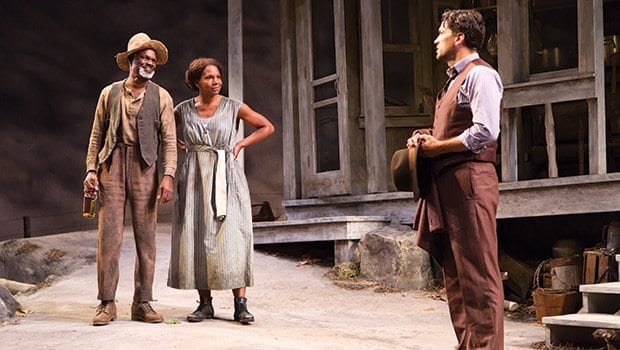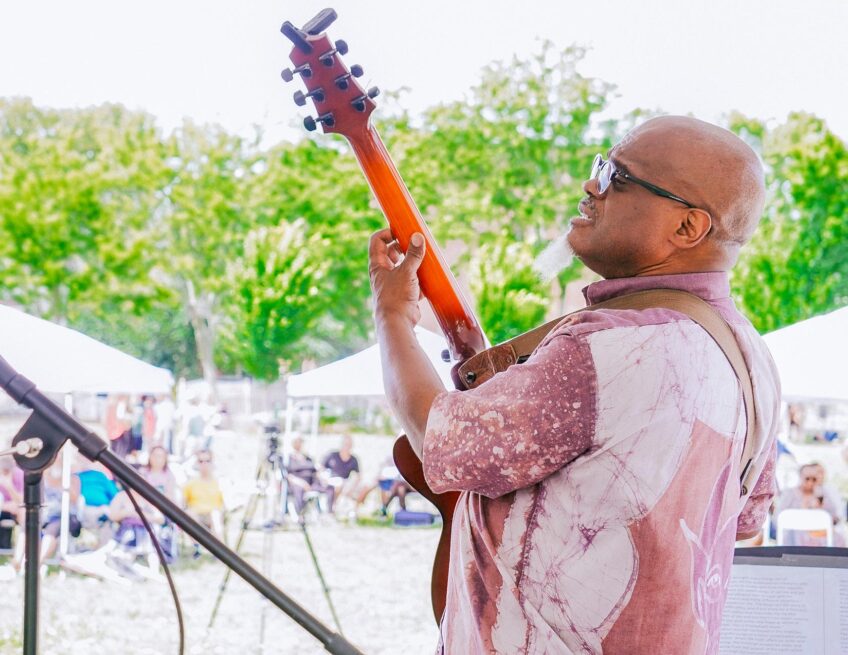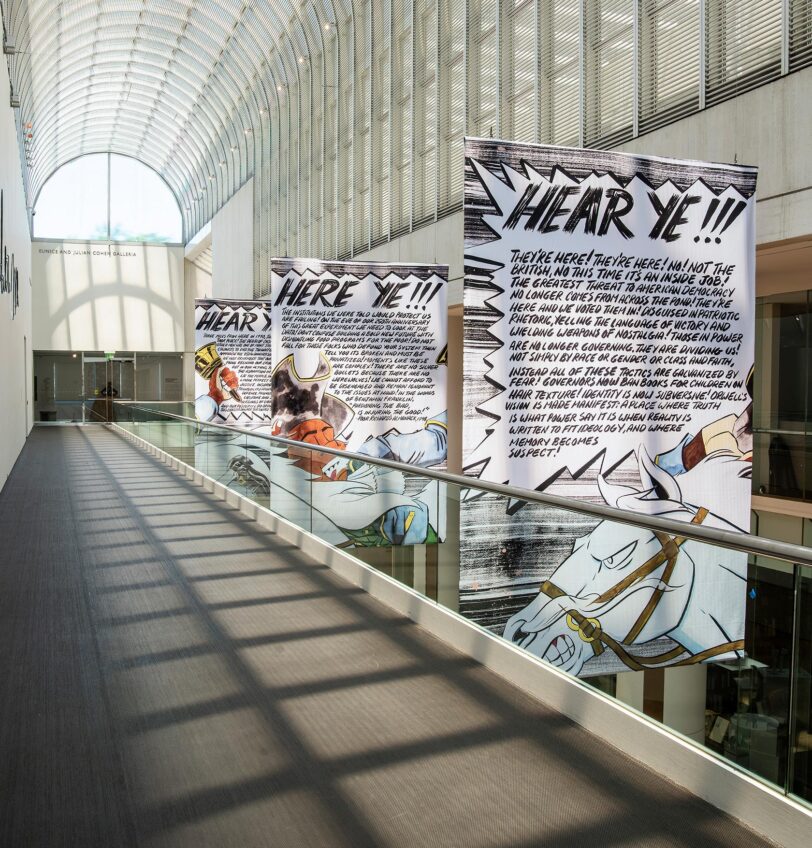Audra McDonald radiates in Eugene O’Neill’s ‘Moon for the Misbegotten’

Audra McDonald radiates vitality, whether she is holding an audience rapt at an evening-length Symphony Hall concert or performing in musicals, plays, operas, film and television. These roles include Bess in American Repertory Theater’s “The Gershwins’ Porgy and Bess,” which debuted here and then moved to Broadway in 2012, earning McDonald one of her record-breaking six Tony Awards.
So it is no surprise that the catharsis is genuine in the encounter between McDonald’s Josie Hogan, daughter of a tenant farmer, and the tragic James Tyrone, Jr., her alcoholic landlord, in the revival of Eugene O’Neill’s “Moon for the Misbegotten” at the Williamstown Theatre Festival in Williamstown, MA through Aug. 23.
The dissolute Tyrone, a stand-in for O’Neill’s brother Jamie, whose alcoholism killed him, finds consolation by unburdening his anguish to Josie one night, under a full moon. McDonald’s Josie is a force of nature in the production. It’s directed by Gordon Edelstein, who casts African Americans in the roles of the Hogan family, poor but spiritually strong tenant farmers that O’Neill envisioned as Irish immigrants.
A painful family life gave O’Neill raw material for some of his greatest plays, including “Long Day’s Journey into Night.” The 1941 play portrays the haunted Tyrone family — the patriarch, an aging actor who squandered his gifts on melodramas; a morphine-addicted mother; and Jamie, who with his younger brother Edmund, shares an appetite for alcohol and prostitutes. Two years later, O’Neill wrote “Moon for the Misbegotten,” a kind of elegy in which Jamie finds the forgiveness and peace that eluded him in life.
Complex portraits
Carried mainly by three characters — Josie, her father Phil Hogan, and Tyrone — over two and a half hours, the play is strenuous to perform, and, at times, strenuous to watch. O’Neill’s characters build in layers of deceit and constantly waiver between pretense and sincerity. And the self-loathing, tortured Tyrone does not seem like a credible match for the robust Josie.
Yet the play is a romance of a sort. Under a full moon, Josie and Tyrone undergo a long night’s journey into day and bring light into darkness. And O’Neill leavens the play’s wrenching scenes with humor as well as a sublime finale. This production’s fine cast and first-rate staging mine all these strengths.
Grounding the naturalistic set by Ming Cho Lee and Lee Savage is an earth-toned cottage with a porch stoop and hand-cranked water pump flanked by a sparsely-leafed tree. The cottage juts at an angle to allow a view of the horizon and the various arrivals and departures that move the story forward. Jane Greenwood’s costumes are true to the characters, from Josie’s plain, workaday dress to Tyrone’s urbane but rumpled suit and Phil’s straw hat and vest.
Jennifer Tipton’s subtle lighting guides the eye to atmospheric details, including Josie’s ladylike bedroom and vintage kitchen, and kindles actors’ faces, heightening intimate moments.
Within minutes of the first act, McDonald’s no-nonsense, industrious Josie dispatches her kid brother Mike (Howard W. Overshown) to a new life beyond the farm and his bullying father. In his brief role, Mike serves to provide a back story for Josie and Phil. He describes their father as a conniving cheat and his sister as “the scandal of the neighborhood” for her reputation as a slut. Mike tells Josie that she, too, should leave the old fox behind, and marry a decent man. Giving Mike cash she’d plucked from the old man’s purse, Josie reminds him that she holds her own with her father, as their late mother did, and dismisses town gossip, saying, “I do my work and I earn my keep and I’ve a right to be free.”
As Phil Hogan, whom Jessie calls an “old hornet,” Glynn Turman at first veers toward caricature in his rendering of a folksy rogue. But as he pursues his knotty schemes and switches between sincerity and trickery, Turman’s Phil brings an indispensible sense of fun to his role as a salty trickster and sparks true chemistry with McDonald’s Josie in their combative but loving father-daughter duo.
Emotional release
Watching a hung-over Tyrone approach the farm, Josie describes him as “a dead man walking slow behind his own coffin.”
Lurching rather than striding and struggling to light a cigarette, Tyrone enters the yard, a dapper but disheveled figure played by handsome Tony nominee Will Swenson, McDonald’s husband. He spouts Latin, mocks his Jesuit education and settles into banter with Phil, whom he regards as his only friend. Nudged by Tyrone about his unpaid back rent, Phil points out his bumper crop of milkweed and poison ivy. Tyrone has promised to sell the farm to Phil for a low price once he receives his mother’s estate, money that will enable him to return to the saloons and brothels of Broadway. After sharing a drink with Phil, Tyrone warns him that a wealthy neighbor is on his way to complain that Phil’s pigs are soiling his pond.
T. Stedman Harder, a pompous toff played by Aaron Costa Ganis, arrives outfitted for a horseback hunt, from jockey cap to jodhpurs. Greenwood’s costume adds to the humor of the scene, making Harder resemble a lawn jockey figurine. The Hogans toss Harder’s cap like a softball as they insult him, ignoring his demand that they confine the hogs to the farm.
Late, Tyrone amuses himself by pretending to accept Harder’s bid to buy the useless farm, just to evict the Hogans. Phil lures Josie into a scheme to stop the sale by seducing Tyrone.
As Tyrone and Josie meet for a moonlit rendezvous on the porch stoop, the scheme unravels and they confess to each other their true feelings. McDonald’s Josie is both powerful and vulnerable in her tug of war with Swenson’s Tyrone. She doesn’t let him retreat as he alternates between exploding with rage at himself and feigning cynicism. Another actress might play Josie as self-sacrificing and heroic, but McDonald shows Josie’s fulfillment as she lets her loving nature come forward. Yet the grueling, high-pitched struggle between the two is almost frantic at times.
As Josie and Tyrone part at daybreak, their peace is palpable. In their final, unforced moments together, they are equals, unburdened by strain and pretence.
McDonald’s Josie radiates joy as she pronounces the play’s last words, a benediction to the departed Tyrone, “May you rest forever in forgiveness and peace.”






